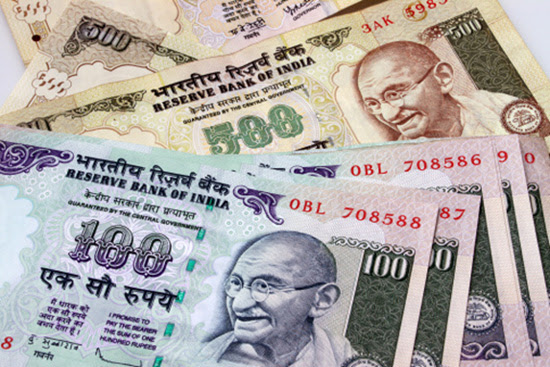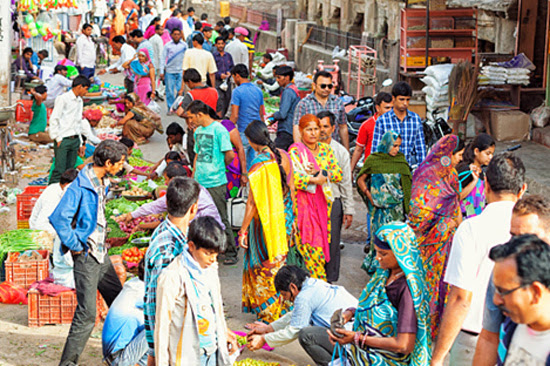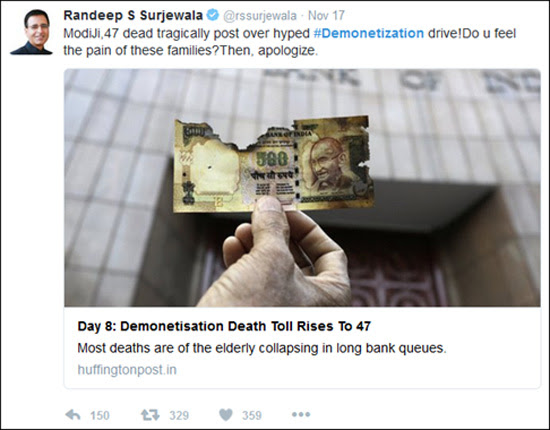
By Patrick Watson*
Two weeks ago, millions of Americans voted against Hillary Clinton because, among other reasons, we thought she would raise taxes or otherwise take our money.
Most of us didn’t notice what happened on the other side of the world that very same day. Indian Prime Minister Narendra Modi really did take everyone’s money.
Citizens of India learned, with only a few hours’ notice, that their 500 and 1,000-rupee notes were no longer legal tender. Those are—or were—the country’s largest-denomination bills and the foundation of a huge underground economy. Now they’re just paper.
The results were what you would expect: confusion, chaos, and fear. Nevertheless, you can bet other governments watched closely. India could be just the first cash domino to fall.

Photo: Getty Images
Modi’s “Demonetization” Turned into a Mess
I must confess to not knowing much about India—the closest I’ve ever been is hearing some Sanskrit words in yoga class. I hope to visit someday, though. When I do, I’ll have to bring my Visa card because my cash may not work there.
The Reserve Bank of India posted this notice on November 8:
Government of India vide their Notification no. 2652 dated November 8, 2016 have withdrawn the Legal Tender status of ₹ 500 and ₹ 1,000 denominations of banknotes of the Mahatma Gandhi Series issued by the Reserve Bank of India till November 8, 2016.
This is necessitated to tackle counterfeiting Indian banknotes, to effectively nullify black money hoarded in cash and curb funding of terrorism with fake notes.
Starting from November 10, 2016, members of public/corporates, business firms, societies, trusts, etc., holding these notes can tender them at any office of the Reserve Bank or any bank branch and obtain value thereof by credit into their respective bank accounts.
Just like that, billions of currency notes suddenly became unusable. They will retain their value until the end of the year, but the only way to use them is by going to the bank and exchanging them for smaller notes, up to a limit of 4,000 rupees (about US$60).
People can also deposit them in a bank account and then use a debit card or electronic transfers for purchases.

Photo: Getty Images
That sounds simple enough, but quickly became a mess.
Lines formed at banks, with people waiting for days, only to find the bank ran out of smaller bills. Those without bank accounts had no way to make routine transactions. Already impoverished people had to spend their work time waiting to exchange their money. New bills intended to replace the old ones were scarce.
The results spread through the economy like wildfire. Merchants lost sales because customers couldn’t pay. Some resorted to barter. Media reports suggest restoring normal commerce could take months.
A few people reportedly died, most of them elderly citizens waiting outside banks for days, but also some overworked bank employees.

Analysts are already saying the sudden contraction will hurt economic growth. Economists at Ambit Capital cut their 2017 GDP growth estimate almost in half, from 6.8% to 3.5%. They think the effects will last into 2018, too.
With consequences ranging from disruptive to fatal, why would any government do something like this?
It’s the latest step in Prime Minister Modi’s war on corruption and tax evasion, much of it conducted in cash. He says restricting cash (he calls it “demonetization”) will help boost the economy.
Maybe it will. Estimates show anywhere from 25-40% of India’s economic activity happens off the books. Bringing it out of the shadows and into the banking system, even by force, may help in the long run. It will certainly raise tax revenue initially. But it also carries a big cost.
Believe it or not, some experts think we should do something much like this in the US.
--------------------------------------------
*Patrick Watson is senior economic analyst at Mauldin Economics. This article is from a regular Mauldin Economics series called Connecting the Dots. It first appeared here and is used by interest.co.nz with permission.
21 Comments
Modi is an Idiot, he doesn't know how to run the country. Majority of the black money is hidden in Swiss bank accounts.
Oh, he knows exactly what he's doing.
It has nothing to do with addressing corruption or interfering with the freedoms of the wealthy.
He is destabilising the country in order to better control it toward his ultimate goal of a more united and tightly governable India. Utopian or Dystopian? Time will tell.
He knows what he is doing, electronic transfers leave a trail whereas cash is a tax evaders dream.
Look at the biggest tax evaders, bakeries, take aways, restaurants, tradies etc.... They will often return only their EFTPOS/Cheque transactions as the cash sales go straight into their pocket.
A cashless society is one with very little to no tax evasion.
Criminals always find a way. Doing away with cash will not stop tax evasion.
I am willing to endure tax evasion and a higher personal tax burden in order to ensure the freedom of my children.
I disagree, the corruption usually starts at the top and works its way down; or as the saying goes "a fish always rots from the head down". The biggest tax evaders or avoiders (and I know the legal difference) are, in no order of evil;
1. Multinationals paying minimal tax elsewhere - the race to zero tax, (Ireland, Delaware, Panama, etc).
2. The beneficiaries of Cronyism and Nepotism - the Marcos family in the Philippines are one of the better known examples - and India will have their own. All hidden in Swiss bank accounts (NZ?) unavailable to their respective taxpayers.
3. Lobbyism. e.g. The US health care system costs the US taxpayer approximately $0.5 trillion dollars per annum in unnecessary costs in the form of over priced drugs (hello Canada) and numerous ticket clipping throughout their broken insurance model (I mean scam).
4. Fake charity status. e.g. We have our own Destiny Church as an example. With the Reverend and his beau enjoying a gold plated lifestyle at the expense of their impoverished congregation.
5. Regressive tax policies in most countries (increasing GST hurts the poorest the most and proposed US and NZ tax cuts will put more money into the top 5%) it all leads to increasing inequality.
6. Inadequate capital gains taxation and the erosion of the tax base. There is a reliance in many countries on taxing labour mainly (PAYE etc) with lots of loopholes for avoiding tax from the use of capital (e.g. no capital gains tax on property in NZ). The average PAYE slave here is likely paying more tax than their landlord.
7. I'm sure there are more I've missed.
8. Cashies from tradies etc are trivial in comparison, and are the end result of "a tragedy of the commons."
Personally I would start at the top of the dung pile....those killing people ...to enrich their own lives.....to supposedly cure ailments.
Doctoring the systems...too.
Now this is really ...sick.
http://www.marketwatch.com/story/fentanyl-billionaire-comes-under-fire-…
You take away cash, you take away peoples freedom.
You really want every bozo bank teller nosing through every transaction you make?
What you got to hide?...
Perhaps you'd like to be the first to publish your financial history, Heavy! By all means, lead the way.
It's also the principle of the right to privacy, and the availability of privacy if desired, which is ingrained in our culture. Yes, some criminals use cash, but some also use BitCoin (e.g. ransomware operators). Some evade paying tax by using cash, but some also pay electronically and still evade paying tax by operating through trusts, shell companies, etc. Never mind the fact that financial institutions are a prime target for hacking and malware attacks.
Cash is also under pressure in the same way that encryption is under pressure by governments and intelligence agencies that would love to have access to everything their citizens do online or on their devices (see e.g. FBI vs Apple and New York District Attorney vs Apple). I have nothing in particular to hide but do not wish to live in a panopticon society (https://en.wikipedia.org/wiki/Panopticon), which the likes of China are trying their best to achieve because, ultimately, they are afraid of their own citizens. Note the Chinese aversion to digital currencies like BitCoin a few years ago, which has suddenly changed, as they have figured out that a central ledger is exactly what they need to monitor everything.
moa man
Cash has not being taken away its replaced by new notes.
Bold move, but being implemented shoddily. As usual the poor and the ordinary citizens pay. May be the Indian Government should pay a one time bonus of certain amount to all the citizens/residents to compensate for their pain ? Of course, by crediting their bank accounts.
@SmoKey - you've nailed it I think "Bold move, but being implemented shoddily."
I suspect the level of prevalent corruption wouldn't have allowed for a better implementations. Apparently even top cabinet ministers including the Finance Minister had no clue!
I think those suggesting we get rid of cash are trying to force everyone to use the bank and electronic transacting. Then central banks will switch to negative interest rates and so steal our money directly, rather than stealing indirectly through money printing and inflation.
Those poor people in India having their money invalidated. What a horrendous situation for so many people who are so poor already
Yeah, I weep for the tax evaders sitting on $10m of cash who will now have to lose all that stolen wealth or deposit it into a bank account and then explain to the Indian tax authorities why they haven't paid tax their entire life. The cockroaches will be pouring out of the wood work now.
The real poor who don't have any money will benefit from a new wealthy Government who will now have a tax base from which they can distribute social welfare to the needy.
don't kid yourself heavyg. Indias big tax evaders could use 100 means other than rupees to avoid tax and hide wealth e.g foreign currency, a foreign trust in little old NZ, Swiss bank accounts, gold, barter, buy shares...you get the idea.
Most of India's people don't have bank accounts and this will hit the poor hard rather than catch the big crooks. If you want to get big fish tax evaders start with the multinationals, NZ included
Yeap, i know for a fact it is hitting the poorer folk the hardest.
And yet the employees, the bribe takers, they all take cash. Wouldn't want it any other way.
What goes around comes around..
In the end, most of it circulates around the local economy anyway.
I did read about and I think anyone who has official money (Money where tax is paid) can go and deposit it in the bank and if they do not have bank account can open one and than deposit it but YES people who had unaccounted money are in trouble and that is the whole idea behind the exercise and also give a blow to counterfeit money and to terrorism (Which now the world is facing) which is funded by unaccounted money.
The problem is that people in fear rush to the bank the very next day, though have time till end of December to bank the money.
In vote bank politics it is a bold step as he is really working for the average / middle class people of his country being from a humble background himself, unlike.........(less said the better)
No gain without pain.
I'm in India right now. My Indian buddies have a bit f mayhem on their hands ( i'm down US$83 but cant be bothered standing in line to deal with it ) However in true India thinking sideways fashion, an investment P2P lending kind of scheme has sprung up. Many are taking their 5 hundy and 1000 rupee notes to the bank and paying off other friends loans with it. Money to be paid back " in good time" as it becomes available .... Love working with these guys ! Always get things done :)
genius
And yes have thrown in my 83 bucks to help that cause too. Paid back in Paneers and Masalas. That will do it !
We welcome your comments below. If you are not already registered, please register to comment
Remember we welcome robust, respectful and insightful debate. We don't welcome abusive or defamatory comments and will de-register those repeatedly making such comments. Our current comment policy is here.